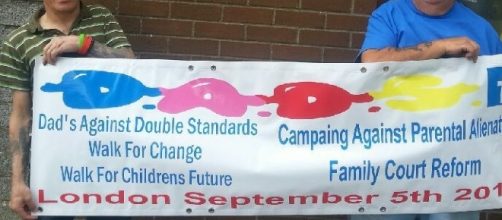With bleeding feet and purpose, Andrew John Teague arrived in the Streets of London on the evening of September 3rd, 2017. Teague undertook a 200-mile trek from Swansea to the courts of London in an effort to raise awareness for the growing problem of Parental Alienation in the UK, and other parts of the world. If you've never heard the term 'parental alienation,' then you can count yourself among the fortunate. The people who have never had to miss a night with their children, or had to gain special permission for a visit of only a few hours.
Teague is no stranger to parental alienation and has dedicated much of his life to drawing attention to a problem that affects children in profound and negative ways.
This is an issue that affects the children first and destroys the lives of both alienated fathers and mothers as a byproduct of an unjust family court system. Teague often stopped along the way to post updates of his progress on his social media pages for his 20,000 followers. Yes, you read that right. 20,000 men and women who have experience with the loss of their children to the family court systems. The numbers don't lie and in fact, give some insight into the massive size of the problem.
Parental alienation is often the byproduct of a divorce or separation influenced by extreme feelings of anger and blame. One parent is often awarded primary physical placement of the child. While the child is living there, the vexed parent pushes their feelings of anger into their children.
They often refuse to allow the children to visit or have contact with the other parent. More often than not, the parent with placement holds all the power. The wheels of Family Court turn slowly, and this results in prolonged periods of separation between the child and the 'noncustodial' parent.
The long-term effects of parental alienation
Many children who are forced to grow up with limited parental contact due to parental alienation display serious psychological problems as they grow into adulthood. They often regress in behavior and suffer serious attachment issues later on in life. Karen Woodall states, "The infantile state of psychological splitting is one which the child regresses to in order to resolve an impossible dilemma, which is that they have been forced to use a coping mechanism of choosing to lose one parent in order to keep the other.
No child should suffer that pain."
These psychological issues can often be exacerbated when children are consistently told untruths about the 'noncustodial' parent. The child can eventually be led to believe that they have been abandoned, or feel that they're betraying one parent by loving the other.
So, where is the middle ground? What can be done in order to effect change in the family court system? The truth is that this is a slow process that will require that the best interests of the children consistently be placed at the forefront of the legal machine. As long as men like Andrew John Teague continue to raise awareness for this cause, change will continue to be a real possibility.


